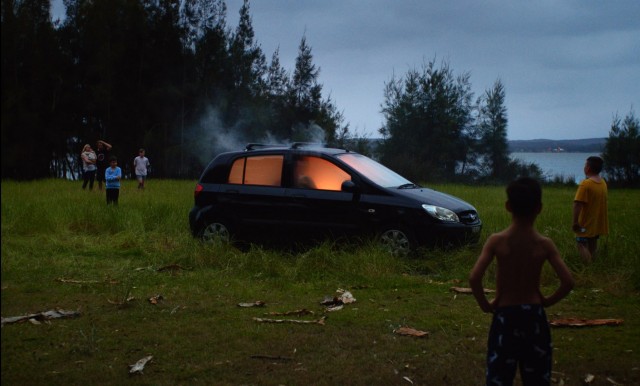Years after witnessing a brutal assault in her small Australian hometown, when a young woman crosses paths with the victim, it triggers a deep sense of culpability she had been suppressing. In Mud Crab, writer/director David Robinson-Smith immerses his audience in his protagonist’s reflections of those events and how the past has potentially affected the present. Haunting and poignant, the film is deeply powerful in its depiction of trauma and its consequences.
“I curated stories into a character that says what I want to say about a place”
“Mud Crab is inspired by where I grew up in Australia”, Robinson-Smith shared with us. Revealing that he crafted his protagonist, and the situation, from many real-life encounters, he “curated” these stories into “a character that says what I want to say about a place”. The normalization of violence in that area was also a theme he wanted to address, along with the idea of “returning to your hometown and seeing someone in a familiar setting who has undergone significant changes”. To achieve this the film is split in two, past and present, thus also becoming about transformation and how the lingering effects of previous events can influence current situations.
Alongside these two timelines, the film also has dual perspectives – the victim and the witness – with the audience trapped in the latter. As the second part of the short focuses on the aftermath of the attack and how it has affected the two protagonists, Robinson-Smith knew he wanted to separate the past from the present both “aesthetically and emotionally”. Working with DP Jaclyn Paterson, the director contrasts the two sections by switching from a bright, energetic summery look in the first half to a darker, heavier atmosphere in the second. The different color palettes compliment the tonal shift perfectly and as a viewer, we know we are still in the same location, but recognise that years have gone by and people have changed.

“A lot of planning and preparation went into the production design, costume and cinematography to separate the two halves” – Robinson-Smith discussing the shoot for Mud Crab
In addition to its visual flair, Robinson-Smith and Paterson also recreate the feeling of revisiting the past by having those scenes feel less real and factual, furthering the idea that it is more about reflecting on the emotions of the events, than what actually happened on the day. Composer James Mountain also adds to the immersive nature of the film, with a score that is at times haunting, but never overbearing, helping to allow the short’s audience to draw its own conclusions.
Mud Crab is a visceral experience, with both Joshua Mehmet and Laneikka Denne’s performances adding to the impact of the film. Through their eyes, they communicate the nuances of emotions they are experiencing, especially in the second half of the short, which is quieter and allows us to be with them with less distractions. Mehmet’s performance is especially impressive when you consider he actually gained/lost 30kg for the role. This physical transformation making the change between the two halves, and the weight of the past, look even more compelling. While Denne’s depiction of guilt is nothing short of remarkable, as it provokes us to reflect on our own past and how we would have reacted in similar situations.
After a World Premiere at the 2022 edition of the Melbourne International Film Festival, Mud Crab went on to be selected at many other festivals, before being nominated for a 2024 Australian Academy Cinema Television Arts Award and winning an Australian Directors Guild Award.

 Céline Roustan
Céline Roustan